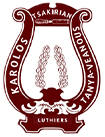A Guide to Traditional Arts in Queens ,1991 Edited By Queen Council of the Arts, written by Amanda Dargan
Αναρτήθηκε από
superadmin
20/11/2023
0 Σχόλιο(α)
A Guide to Traditional Arts in Queens ,1991 Edited By Queen Council of the Arts, written by Amanda Dargan
GREEK INSTRUMENT MAKER
[blockquote2]“After my father died, I came back to finish some instruments. I had to finish them. For one thing, I needed the money. So I finished them and all of a sudden I way in love. I guess the thing I was missing was the responsibility of doing it all myself. I wish I had known this all along."[/blockquote2] 
The N subway train, which runs along the elevated tracks above 31st Street in Queens, will bring you to Greek Astoria, where a proliferation of Greek-language signs-TAVERNA, KAFFENION ("coffee shop"), and ZAXAROPLASTEION ("pastry shop"), advertise neighborhood eateries. Local residents enjoy such delicacies as avgolemona (egg-lemon soup), a variety of roasted lamb dishes, the crescent-shaped kourabiedes cookies, and thick black coffee. If you get off the train at the 30th Avenue station and walk a few short blocks east towards Steinway, you will arrive at the workshop of instrument maker Karolos Tsakirian.The small workshop is filled with Greek instruments in various stages of construction. Bouzoukis, ouds, and two smaller instruments in the oud family, tzouras and baglamas, hang from the walls along with templates designed by Karolos's father Nick for the decorative inlays used on the face of the instruments. Photographs of famous Greek musicians holding Nick Tsakirian's instruments line the walls. Karolos is the third generation of instrument makers in his family. His grand-father, Agop, moved to Greece from Turkey when he was fourteen and eventually opened an instrument shop in Piraeus, near Athens. He taught his son Nick who joined him in the business, and who eventually, opened his own shop in Athens. At the of fourteen, Karolos began working full time in his father's shop while attending high school at night. Nick immigrated the United States in 1974, and Karolos followed in 1977, helping in the workshop father had opened in Astoria and studying accounting at night. He had mixed feelings about the often lonely occupation of instrument making. He got impatient “waiting for the glue to dry" and dreamed of opening a musical accessories store.Nick Tsakirian died in 1984.Not long afterwards, Karolos returned to the shop to complete a few outstanding orders and to begin the process of closing down the shop. "After my father died," he said, "I came back to finish some instruments. I had to finish them. For one thing, I needed the money. So I finished them and all of a sudden I was in love. I guess the thing I was missing was the responsibility of doing it all myself. I wish I had known this all along. The shop did not close. Karolos perfected his skills, and began selling his own instruments not only to Greek and Middle Eastern musicians, his biggest clients, but also to Irish musicians who have begun to incorporate bouzoukis into their music. He still owns his father's shop in Athens, which his mother manages, and continues to fill orders there as well. Asked how he viewed the future of the business, Karolos replied: "If you are good at something, you can always make a living. I'll never make millions doing this, but that was never my goal. It's a very fulfilling kind of work. I can't think of myself doing anything else. 30-08 34th STREET ASTORIA, QUEENS
